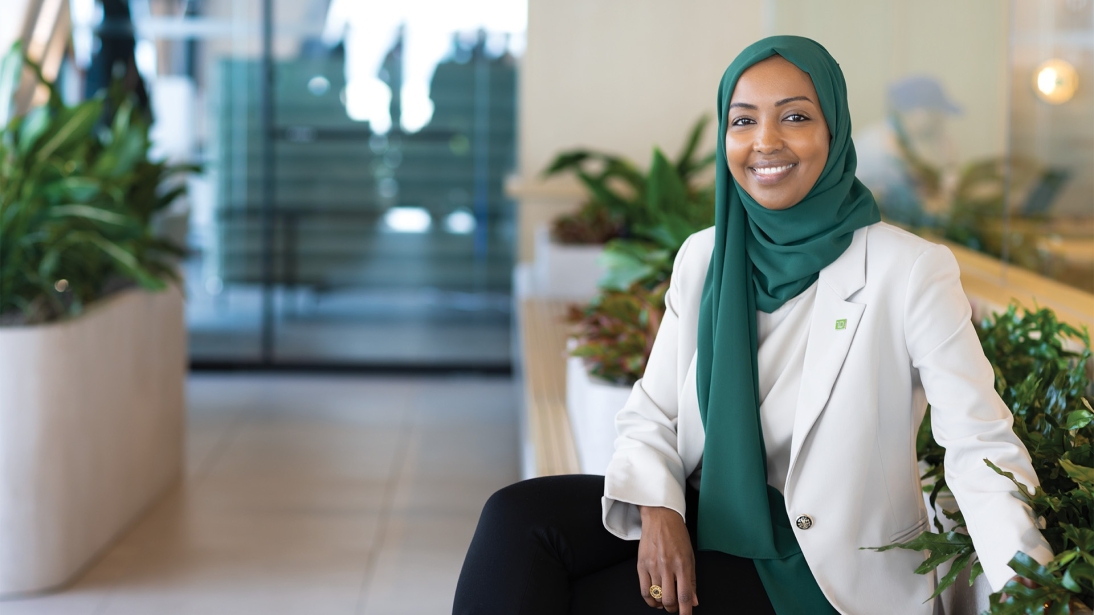When you prioritize human-centred design in the creation of an office or retail space, it’s about having an innovative problem-solving mindset that focuses on the people you're creating for, says Yasmien Fadl.
“We’re creating environments for people to not only navigate easily, but to feel good in,” says Fadl, Head of Design and Experience, Enterprise Real Estate at TD.
“It’s really about responding to the needs and wants of the people, and how they use their spaces. You can solve any business problem better when you use a design-thinking methodology versus a traditional rigid management framework. Design thinking is the key to innovation. It unlocks the potential for much more innovative and comprehensive solutions, rather than a traditional status quo approach.”
Fadl — who led the design and experience strategy of the groundbreaking 47-floor TD Terrace —was recently named to WXN’s list of Canada’s top 100 most powerful women.
“There’s so much more opportunity and potential for us [as women] to continue to lead and take up even greater space,” Fadl says.
“I love that there’s some recognition that … some of my team's contributions are making a difference. Each of us has been shaped by our unique experiences and conditions, which will yield different preferences and needs. It's easy to lean into our biases and overlook others' needs because they may not feel relatable to us on an individualized level … but it is so important – now more than ever – to continuously check that bias and pursue every opportunity to provide flexible solutions that can maximize the sizes, conditions, and needs that are accommodated by our spaces, products and services. This approach also allows us to see our blinds spots and earn the hearts and minds of TD colleagues and customers.”
The list of reasons Fadl’s colleagues included in her nomination is long, but at the top is how Fadl uses physical environments to build inclusive experiences that meet the needs of all kinds of people, who either work at the bank or interact with it.
“Great workplaces are about performance and productivity, but they are equally about belonging, comfort and ease,” she says.
“Creating space for people, especially people that are often left behind or under-considered, is the most rewarding aspect of my role and I'm really proud of what we've been able to accomplish here at TD.”
Fadl, who’s been at the Bank since 2017, has championed an approach to design that integrates inclusive spaces — wellness rooms, prayer rooms, lactation rooms, and spaces to accommodate a neurodivergent workforce — with other environments that can help people gather, learn, collaborate and recharge, all in the same location.
“In any role, you want to leave behind a legacy that says you have done your absolute best to not leave anyone behind,” she says.
Before starting at the Bank, Fadl says she worried it might be a top-down culture that relied on hierarchies. The opposite was true.
“It’s such an organic environment, where even the smallest seedlings can actually sprout into an idea” she says. “It was quite liberating.”
Originally from Sudan, Fadl came to Canada with her parents 27 years ago. As an adult, she lived and worked in the United Arab Emirates before returning to Toronto, where she lives with her husband and three children.
Outside of her work at TD, Fadl chairs the Disrupting Design advisory board for JennAir, which helps Black, Indigenous, and racialized designers overcome the stubborn institutional and structural challenges they face in the design industry.
“[The challenges] are exactly the same as when I was in school,” Fadl says. “It’s better that there’s discourse about it now, but it’s frustrating that we haven't reduced enough barriers in the past 20 years.”
Fadl also mentors newcomers to Canada, many of whom reach out to her directly for advice on breaking into the design industry without Canadian experience.
“I left Canada and came back and there were so many barriers when I returned. I was a Canadian with a Canadian degree, I’d designed a bunch of hotels in Dubai, I had a great portfolio and worked with the best firms, and I still ran into the same challenges. So, I was newly immigrating back to my own country, and facing the unnecessary roadblocks immigrants face when moving here,” she says.
“We have to lift people up at every opportunity we can.”
Fadl leads a team of 27 full-time colleagues and contractors at TD who bring their diverse perspectives and experiences into the work they do.
Fadl takes a flat approach to running her team, meaning that whoever has the most innovative idea gets to pursue it — not whoever has the most seniority.
The scale of her role and how it has the potential to fundamentally improve the lives of TD colleagues and customers motivate Fadl, she says.
“There are human beings that have needs and desires and wants, and … we should be responding to those, and ideally be proactively ahead of those needs, right?”
If she could give her younger self advice, Fadl says she’d likely tell herself not to stay in any role where she doesn’t have a voice or feel valued.
Coming from an immigrant family, Fadl says it can be hard not to just keep your head down.
“One hundred per cent, that’s what I’d want to say to my younger self: if they don’t want your opinion, there’s a lot of other places that do.”
